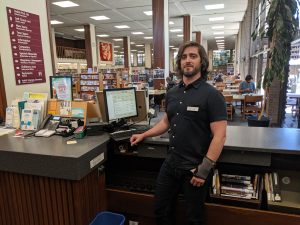A Listening to Student Voices post by SJSU School of Information student Philip McGough.
According to Rolf Hapel, “Libraries aren’t just entities that have dropped down from heaven” (As cited in Peet, 2018, LIS instruction section, para. 2). Libraries are working hard to please their users. They have plans, goals, and objectives. One of those goals is to provide a space where everyone feels welcome. Even in this age of digitization, the library as a physical space remains an important element of the services that the library provides (Hapel as cited in Peet, 2018). Laerkes (2016) writes that this space should be for people to do things in, not a “passive, collection based space” (Para. 2). Laerkes (2016) discusses the four spaces model, and the many different types of activities a particular library might want to emphasize, such as artistic activities, lounging, organized meetings, and learning opportunities for children and adults. By providing space for all kinds of activities, the library is providing space for all kinds of learning. This will most likely include books and a quiet space for good old-fashioned reading, because people still want those things too (Rainie, 2014).
Providing these different types of spaces means that libraries must be fluid. Or, as Stephens (2016) puts it, “Changing daily. Filled with art, sound, life, and inspiration” (Para. 1). This fluidity can be physical, such as the motorized system of 50-foot screens used to change the space of the massive LocHal library to fit that day’s needs (Schwab, 2019).
Fluidity can be policy-based as well. Østergård (As cited in Stephens, 2016) urges us to get rid of rules that get in the way of people actually using the library. After all, people have to be comfortable in a space if they are going to use it. The Galiwin’ku library tossed the revered Dewey Decimal Classification when they decided their users would be better served by a categorization system based on the culture of the community (Thompson & Trevaskis, 2018).
Libraries create space for their users in cyberspace as well (Laerkes, 2016). Invercargill City Libraries has an amazing online presence (Eng & Mager, 2018). It is almost as if they are showing an idealized version of their libraries, but so what if they are? Everyone’s Facebook page is like that. It is a story about their libraries that their users can be a part of.
Here’s some of my favorite slides from their APLIC18 presentation (Eng & Mager, 2018):






References
Eng. A., & Mager, B. (2018). Keeping up with the librarians [PDF]. Available from https://www.dropbox.com/s/onsho3q3uvh6kst/KeepingupwiththelibrariansWithNotesFINAL.pdf?dl=0
Laerkes, J.G. (2016, March 29). The four spaces of the public library [Blog post]. Retrieved from https://blogs.ifla.org/public-libraries/2016/03/29/the-four-spaces-of-the-public-library/
Peet, L. (2018). Rolf Hapel: Toward a global instruction and practice. Library Journal. Retrieved from https://www.libraryjournal.com/?detailStory=rolf-hapel-toward-global-instruction-practice#_
Rainie, L. (2014). 10 facts about Americans and public libraries. Retrieved from https://www.pewresearch.org/fact-tank/2014/01/24/10-facts-about-americans-and-public-libraries/
Schwab, K. (2019). The library of the future is an 80 year-old converted train shed. Retrieved from https://www.fastcompany.com/90316219/the-library-of-the-future-is-in-an-80-year-old-converted-train-shed?fbclid=IwAR17fZ3TDaYY2n-fQEvpGJLrXw8ft-ZoxoX4VO7CbXno6eKEz0xCRrBzA2Q
Stephens, M. (2016). Dream. Explore. Experiment. Library Journal. Retrieved from https://www.libraryjournal.com/?detailStory=dream-explore-experiment-office-hours
Thompson, J. & Trevaskis, L. (2018). A remote library dropping Dewey to use local indigenous concepts instead. Retrieved from https://www.abc.net.au/news/2018-08-22/remote-galiwinku-library-closes-book-on-dewey-decimal/10147024

